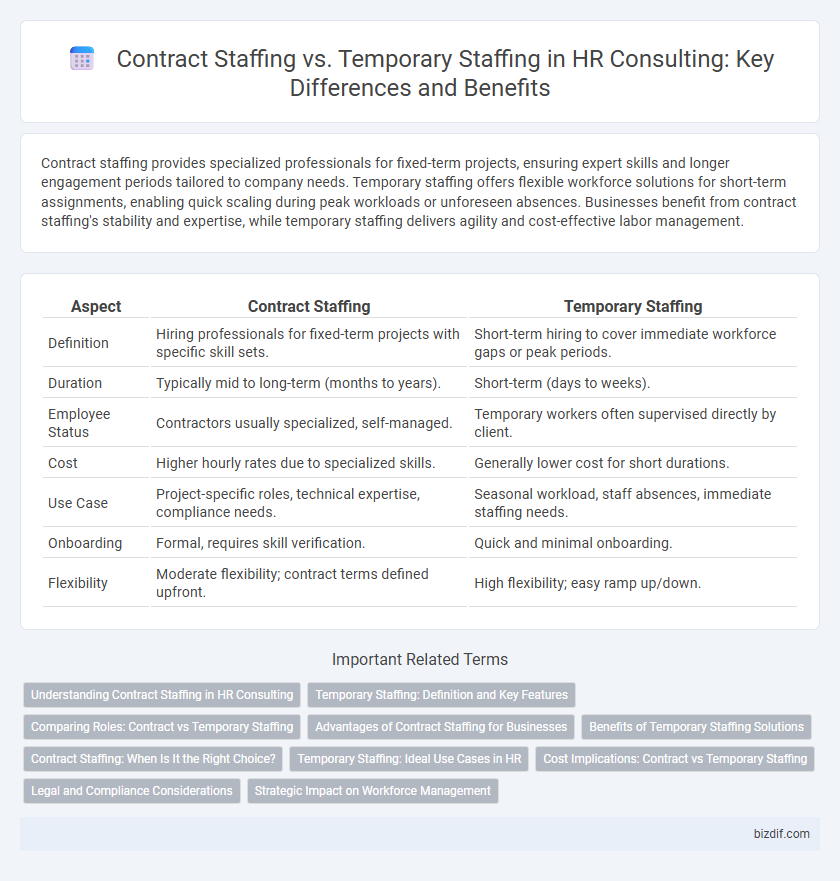Contract staffing provides specialized professionals for fixed-term projects, ensuring expert skills and longer engagement periods tailored to company needs. Temporary staffing offers flexible workforce solutions for short-term assignments, enabling quick scaling during peak workloads or unforeseen absences. Businesses benefit from contract staffing's stability and expertise, while temporary staffing delivers agility and cost-effective labor management.
Table of Comparison
| Aspect | Contract Staffing | Temporary Staffing |
|---|---|---|
| Definition | Hiring professionals for fixed-term projects with specific skill sets. | Short-term hiring to cover immediate workforce gaps or peak periods. |
| Duration | Typically mid to long-term (months to years). | Short-term (days to weeks). |
| Employee Status | Contractors usually specialized, self-managed. | Temporary workers often supervised directly by client. |
| Cost | Higher hourly rates due to specialized skills. | Generally lower cost for short durations. |
| Use Case | Project-specific roles, technical expertise, compliance needs. | Seasonal workload, staff absences, immediate staffing needs. |
| Onboarding | Formal, requires skill verification. | Quick and minimal onboarding. |
| Flexibility | Moderate flexibility; contract terms defined upfront. | High flexibility; easy ramp up/down. |
Understanding Contract Staffing in HR Consulting
Contract staffing in HR consulting involves hiring professionals for a fixed duration to complete specific projects, allowing organizations to access specialized skills without long-term commitments. This approach ensures flexibility and cost efficiency by aligning workforce needs with business demands, reducing overhead associated with permanent employees. Contract staff often bring industry-specific expertise, enhancing productivity and driving project outcomes within defined timelines.
Temporary Staffing: Definition and Key Features
Temporary staffing involves hiring employees for a specific, short-term period to meet immediate business needs, such as seasonal demand or project-based work. This type of staffing offers flexibility, allowing companies to quickly adjust workforce levels without long-term commitments or benefits obligations. Key features include predefined contract durations, roles tailored to urgent tasks, and simplified onboarding processes to ensure rapid deployment.
Comparing Roles: Contract vs Temporary Staffing
Contract staffing involves hiring professionals for specific projects or fixed durations, typically requiring specialized skills and longer engagement periods. Temporary staffing focuses on short-term, flexible labor needs to address immediate workload spikes or seasonal demands, often encompassing general or entry-level roles. Both models offer scalability but differ in commitment length, role specificity, and strategic impact on workforce planning.
Advantages of Contract Staffing for Businesses
Contract staffing offers businesses enhanced flexibility by allowing them to scale their workforce based on project demands without long-term commitments. It provides access to specialized skills and expertise tailored to specific roles, improving operational efficiency and productivity. Cost savings arise from reduced benefits obligations and streamlined onboarding processes compared to permanent hires.
Benefits of Temporary Staffing Solutions
Temporary staffing solutions offer businesses immediate access to a flexible workforce, reducing overhead costs associated with full-time employees such as benefits and long-term commitments. These solutions enable companies to quickly scale their operations during peak periods or special projects without the complexities of permanent hiring. Enhanced workforce agility through temporary staffing improves productivity and helps maintain continuity in business operations during workforce fluctuations.
Contract Staffing: When Is It the Right Choice?
Contract staffing is the right choice when organizations require specialized skills for a fixed period without the long-term commitment of permanent hires. This model offers flexibility to scale the workforce quickly for project-based work, ensuring cost efficiency and access to expert talent. Contract staffing is ideal for roles demanding technical expertise, compliance with industry standards, and when companies aim to mitigate risks associated with employee turnover.
Temporary Staffing: Ideal Use Cases in HR
Temporary staffing is ideal for managing short-term projects, seasonal workloads, and unexpected employee absences, providing flexibility without long-term commitment. This approach enables HR departments to quickly scale workforce capacity while controlling labor costs and minimizing administrative burdens. Organizations in retail, healthcare, and event management frequently leverage temporary staffing to maintain operational efficiency during peak demand periods.
Cost Implications: Contract vs Temporary Staffing
Contract staffing generally incurs higher upfront costs due to specialized skill requirements and longer engagement periods, but it can reduce long-term expenses by lowering turnover rates and training needs. Temporary staffing often offers lower initial costs and flexible workforce adjustments, yet may lead to increased expenses from frequent onboarding and variable productivity levels. Businesses must weigh these cost implications against operational demands to choose the optimal staffing model.
Legal and Compliance Considerations
Contract staffing involves hiring employees for specific projects under fixed-term agreements, requiring strict adherence to labor laws such as workers' compensation, tax withholding, and employee classification to avoid misclassification risks. Temporary staffing typically engages workers through agencies, shifting legal and compliance responsibilities like payroll taxes, benefits, and liability coverage to the agency, thus mitigating direct employer exposure. Ensuring clear contract terms and compliance with federal and state regulations like the Fair Labor Standards Act (FLSA) is critical to manage risks and protect both the company and workforce.
Strategic Impact on Workforce Management
Contract staffing provides organizations with specialized talent for defined project durations, enabling strategic alignment with business goals and reducing long-term employment costs. Temporary staffing offers flexibility in addressing short-term workload fluctuations, helping maintain operational continuity without permanent commitments. Both approaches enhance workforce agility, but contract staffing typically supports more complex, skill-specific roles that drive strategic workforce planning.
Contract Staffing vs Temporary Staffing Infographic

 bizdif.com
bizdif.com